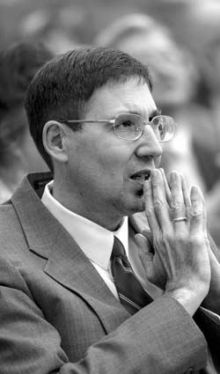This week John E. Herbst, Ambassador Extraordinary and Plenipotentiary of the US, is leaving Ukraine. He is heading for Washington to take over as Coordinator of the State Department’s Office for Reconstruction and Stabilization. Obviously, the diplomat is leaving Kyiv with the sense that he fulfilled his duties. When he arrived in Ukraine three years ago, he stressed that his main objective was to improve relations between Kyiv and Washington.
The Orange Revolution occurred during his ambassadorial tenure. This was followed by a real thaw in the relations between our two countries, crowned by the repeal of the Jackson-Vanik amendment and the granting of market economy status to Ukraine. Herbst had a chance to witness what he calls two democratic elections in our country. The Day began the interview with Ambassador Herbst by asking if he believes his ambassadorial mission has been accomplished, even though Ukraine is still without a cabinet.
“Naturally, it would be better to leave Ukraine after it has formed a coalition government. But I am going long before the official term for its formation expires. Why do I have to go to Washington right now? The reason is the position that I will occupy has remained vacant for almost four months. Besides, although the formation of a coalition is extremely important, it is not of a fundamental nature. The essential fact is that Ukraine has had two democratic elections in a row: the presidential election rerun in 2004 and the parliamentary election last March. The Verkhovna Rada election may be unhesitatingly called the freest and fairest in Ukrainian history. Above all, President Viktor Yushchenko must be given credit for this. I consider the democratic nature of these elections the logical final touch to my stay in Ukraine.”
If the formation of a cabinet is not a fundamental factor, do you think the domestic political situation in Ukraine is predictable?
“The last elections were important not only because the authorities allowed them to be free but also because all the participants in this race tried to achieve victory by democratic means. It was very pleasant to watch political leaders doing their political work according to the same standards that exist in all democracies. As you know, some participants of the last parliamentary elections did not adhere to democratic principles. As for the current problems with the coalition, they are not unusual in a democratic society. We also witnessed very difficult coalition negotiations in Germany after the latest elections.”
Some politicians say that a coalition that includes the Party of Regions will be a departure from democracy.
“We would like to see a coalition devoted to the cause of reforms. The formation of the cabinet depends on the politicians who were elected to the Verkhovna Rada. We will cooperate with the government that is formed as a result of negotiations between these politicians.”
Your successor William Taylor said the US is interested in a revision of the Ukraine-Russia gas deal.
“The same applies here: it is the government of Ukraine that should address this problem. If the government of Ukraine concludes that the gas deal should be revised, it will find support and understanding on the part of the US. As you know, since January of this year the US has not hesitated to point out certain problems in this connection.”
There have been many changes in US-Ukraine relations in the past year. What problems are still on the agenda?
“As of today, our relations are very good indeed. We can certainly point to a number of steps that prove this convincingly: the restoration of privileges under the Generalized System of Preferences (a program that gives most products from less-developed and developing countries duty-free access to the US market — Ed.), a bilateral agreement on the WTO, granting Ukraine market economy status, and the repeal of the Jackson-Vanik amendment. All these steps show the progress Ukraine has achieved in its reform-related activities.”
What opportunities have been lost in US-Ukraine relations over the past few years?
“US-Ukrainian relations saw a cool period of three or four years that lasted approximately from 1999-2000 until the presidential election. I can say that this period was lost time. But we have regained what we lost in the last 15 months.”
What would you advise your successor and all foreigners who want to know more about Ukraine? What three pieces of advice would you offer?
“It is very important to listen attentively to the people you are dealing with. It is equally important to understand the motivation of the people with whom you are talking and contacting, the motivation of political forces. And, of course, it is extremely important to understand the national interests of your own country. The positive side of being the US ambassador to Ukraine is that Ukraine and the US generally have very similar interests. This interest is, above all, that Ukraine should be a democracy and a market economy. This is the road not only to freedom but prosperity.”







